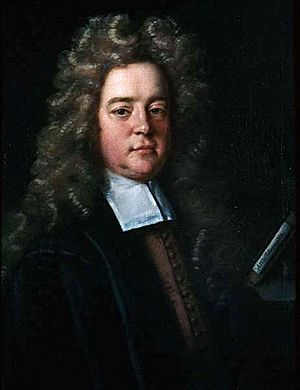William Musgrave facts for kids
Quick facts for kids
William Musgrave
|
|
|---|---|

William Musgrave, by Thomas Hawker (1640-1725), assistant to the court painter Sir Peter Lely
|
|
| Born | 1655 |
| Died | 1721 |
| Nationality | British |
| Alma mater | Winchester College; New College, Oxford, |
| Occupation | Physician |
| Known for | Secretary to the Royal Society |
William Musgrave (1655–1721) was an important British doctor and historian. He was known for his work in medicine and for studying ancient Roman history in Britain.
Contents
Who Was William Musgrave?
William Musgrave was a smart person who lived a long time ago, from 1655 to 1721. He was a physician, which means he was a doctor. He was also an antiquary, someone who studies old things, especially history and ancient objects.
Early Life and Education
William Musgrave went to school at Winchester College. After that, he studied at New College, Oxford, which is a famous university. He was a special member there, called a fellow, from 1677 to 1692.
In 1680, he also spent a short time studying at the University of Leiden in the Netherlands. This shows he was very dedicated to learning.
A Life in Medicine
William Musgrave was very interested in science and medicine. In 1684, he became a member of the Royal Society. This is a very old and respected group of scientists in Britain. They focus on improving knowledge through science.
In 1685, he even worked as a secretary for the Royal Society. He helped edit their science magazine, called Philosophical Transactions. He also practiced medicine in Oxford and earned his M.D. degree in 1689.
Later, in 1692, he joined the Royal College of Physicians in London. This was another important group for doctors. He eventually moved to Exeter and worked as a doctor there until he passed away.
Musgrave's Medical Discoveries
Musgrave wrote many things about health. He studied topics like lacteals (tiny vessels in the body), palsy (a type of paralysis), and how we breathe.
His most important medical work was about arthritis, a condition that causes joint pain. He wrote a book called De arthritide symptomatica. In this book, he gave the first scientific description of something called 'Devonshire colic'. This was a painful illness that affected people in Devon.
Exploring Ancient History
Besides being a doctor, William Musgrave loved history. He wrote a book called Antiquitates Britanno-Belgicae. This book was about the Roman Empire's history in parts of Britain.
He studied areas like Hampshire, Wiltshire, and Somerset. These places were once home to an ancient group of people called the Belgae. His work was so good that King George I gave him a diamond ring as a gift!
 | Stephanie Wilson |
 | Charles Bolden |
 | Ronald McNair |
 | Frederick D. Gregory |

